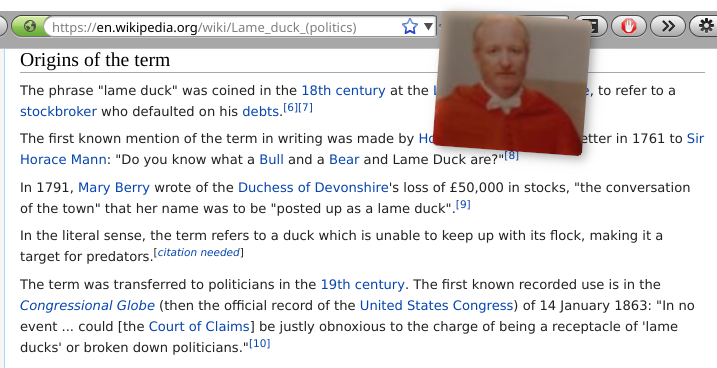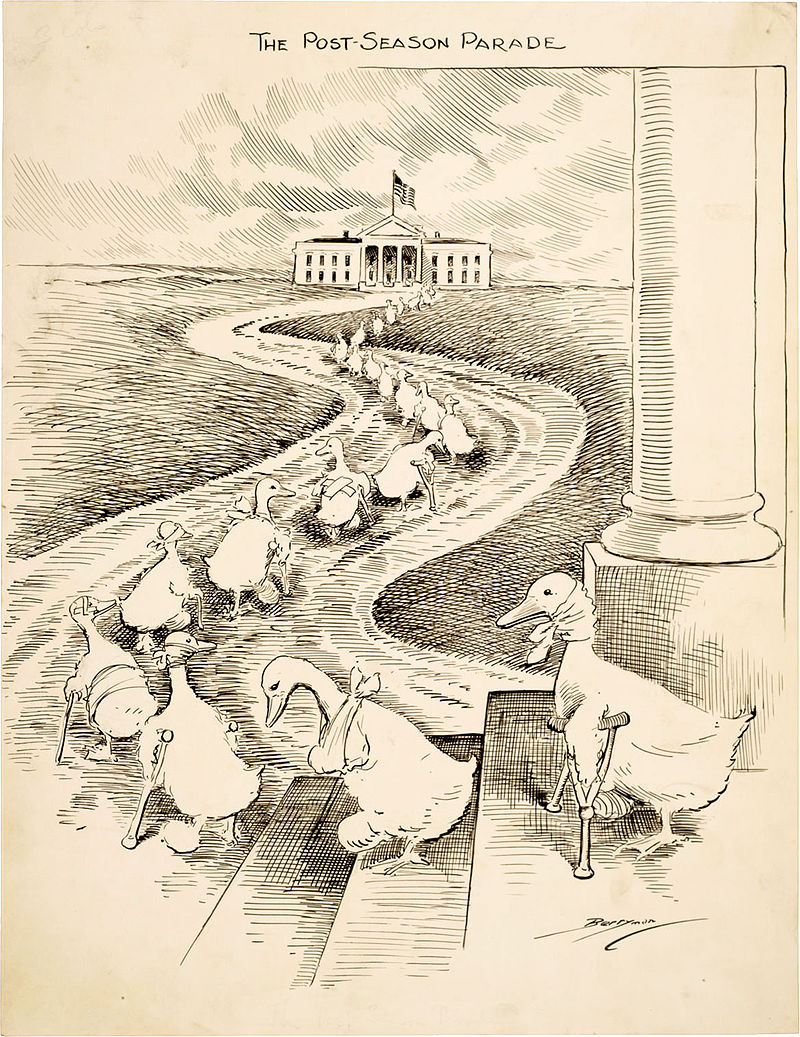

Reference: Lame duck
BACK in March of last year staff representatives at the EPO (Central Staff Committee) spoke to constituents/staff about "[a]djustments to the new career system" (that was before breakdown of talks with António Campinos; still a 'grace period' after 8 years of Benoît Battistelli).
Reference: sc19041cl-0.3.1/4.2.1/6.1 Date: 19.03.2019
Mr António Campinos President of the EPO
ISAR - R.1081
OPEN LETTER TO THE PRESIDENT
Setting-up a Working Group (WG) on adjustments to the performance management system and procedure for incompetence
Dear Mr President,
The CSC thanks you for your letter dated 22 February 2019 in which you propose to resume discussions started in 2018 and reconvene the WG on performance management and procedure for incompetence. We welcome your declaration that “any career and performance management has to be regularly reviewed and adapted”. As a first step, we have accepted the invitation to a first VICO “kick-off” meeting to take place on 21 March.
Composition of the Working Group It would appear that the main interlocutor involved from the side of the Administration is one who has shaped (the implementation of) the performance management system, with somewhat limited success. By contrast, we believe it is necessary to equip your delegation with nominees whose presence does not preclude any success of the working groups ab initio.
Mandate / scope In view of the short duration of this first meeting, we propose to focus our discussions on the mandate of this working group and the time frame for its work. Some guiding principles for the working group could (in our view) be based upon input we have already provided to you with our documents: - “Position of the CSC with regard of performance management” (sc18154cl sent as annex to our letter sc18153cl dated 14 November 2018); - Annex 1 “Adapting the career system to EPO needs” to our letter sc18138cl dated 19 October 2018; - Our letter sc18121cl on Article 52 (procedure for incompetence).
While our nominees will reference these documents as a starting point for the discussions in the working group to establish its mandate, we do not forget the deliverable that is expected to come out of it: proposals for (necessary) change.
The CSC remains convinced that there is an urgent need to amend the current career system to make it fit for an Office granting high quality patents, to motivate staff and to reduce litigation while ensuring long term sustainability.
A first step of devising fair transitional measures (with a corresponding budget) from the previous to the current career system, as was done in the EU institutions, could address past litigation. Further amendments to the system, as a result of successful social dialogue, might lead to increased transparency, thereby avoiding discrimination and perhaps preventing further litigation. It would also foster staff engagement.
The members of the Working Group appointed by the CSC look forward to receiving the statistical data on the implementation of the New Career System since 2015 onwards (requested with our letter sc19040cl dated 8 March 2019).
Finally, our expert nominees are looking forward to collaborating with the career specialists you will appoint from your side to try and ensure that this new working group delivers proposals for change that are to the benefit of the EPO and its staff.
Yours sincerely,
Chairman of the Central Staff Committee
Enclosures in electronic form: Letter sc18121cl Letter sc19040cl
"This was shortly before the faked financial 'analysis' (justifying the robbery of present and past staff, mostly for gambling purposes)."It is important to remind ourselves that at this stage the representatives were still hopeful, trying to be optimistic as if there's a chance of a real turnaround. "A first step of devising fair transitional measures from the previous to the current career system," they wrote, "as was done in the EU institutions, could address past litigation."
This was shortly before the faked financial 'analysis' (justifying the robbery of present and past staff, mostly for gambling purposes). Future staff? What future? The EPO plans layoffs, not recruitment. The destruction of the Office is already underway.
Exactly one week later those same staff representatives spoke of "[w]orrying performance assessment for 2018". Here's the full letter, signed by the same people with copies sent to Vice Presidents Stephen Rowan, Nellie Simon, and Christoph Ernst:
Reference: sc19039cl-0.3.1/4.2.1 Date: 08.03.2019
Mr António Campinos President of the EPO
ISAR - R.1081
Performance Assessment for 2018
Dear Mr President,
The Staff Representation feels obliged to report to you on the enormous anxiety, worry and demotivation among many of our colleagues caused by the performance assessment for the year 2018, confirmed by the quite negative hands-on experience of many colleagues in the assessment exercise in the last few weeks.
In particular, the CSC sees an urgent need to discuss with you one recent publication:
- Guidance to performance assessment 2018 - Performance assessment of examiners and formalities officers of 19th February 2019.
This document includes crucial elements of the system for structuring the planning and evaluation of the work of about five thousand employees in DG1. The document establishes a classification with four possible grades:
● above the expected level ● at the expected level ● below the expected level or even ● far below the expected level
A very similar scale based system ranging from (1) “Excellent” to (5) “unsatisfactory” also existed in the performance assessment system described in Circular 246 until the year 2014, with the fundamental difference that it also comprised a fifth possible, positive evaluation:
● (1) – Excellent, which corresponded to a level “far above the expected level”
Since the founding of the European Patent Organisation, however, the number of employees with a negative assessment – below or far below the expected level – has been consistently very small, indeed almost negligible1. This has also been the result of a very careful recruitment procedure, where the competencies and skills are monitored at the beginning.
Such a distribution of individual assessments seems to be still in line with “normal” national and international administrations.
This year, possibly for the first time in the forty years of the Organisation’s history, the Staff Representation is observing an abrupt change in the hitherto essentially consistent assessment system, and many colleagues are reporting that their performance will be evaluated “below” or “far below” the expected level, much worse than what should be expected.
Historical trends and statistics may be unpopular with (some) managers or consultants. However, we fail to understand why an institution praised as a leading actor in IP matters worldwide should set its own standards in such a manner that it ends up portraying itself as relying to quite an extent on the work of staff it considers unable to meet their “targets”. Importantly, it is not plausible at all that more than 30% of the highly educated and carefully selected staff members in DG1 will become “underperformers” overnight.
Moreover, and contrary to the past, consultation with the Staff Representation on the Guidance to performance assessment has not taken place2, which leaves doubts whether an improvement in management style is intended at all. Further it appears that reference figures, for example reference examiners, so-called “corridors”, etc. are neither public nor have they been a matter of consultation with the Staff Representation. We cannot see any improvement on that front either.
In fact the announced performance assessment system appears as continuing, or even reinforcing, past and outdated prejudices against staff, in particular Examiners and Formalities Officers. It is completely at odds with your intention to establish a renewed and genuine (social) dialogue based on pride and “engagement”: this system and its implementation cannot but be regarded as a slap in the face for all DG1 employees.
____ 1 This margin has been kept throughout all subsequent performance management systems (see for example previous Circular no. 246, item A. (5), CODEX March 2015). It is also referred to in the Joint Communiqué from VP1, VP2 and the CSC to all DG1 and DG2 examining staff ProPro ll for 2004, 2005 in Munich. This document, signed by the then Vice-President DG1, the Vice-President DG2 and the Chairman of the CSC, confirmed that only 0,9% of the Examiners were given – in the year 2004 – a productivity box marking below 3 (good). 2 The guidance to performance assessment refers to the amended version of circular 366 (“New Circular 366”). This circular has not entered into force, but was withdrawn before any discussion in the GCC meeting of December 2018.
In addition, the consequence of an abnormal number of negative appraisal reports will in all likelihood be an increased number of conciliation/objection procedures before the Appraisals Committee possibly followed by ILOAT complaints, which is not in the common interest of the EPO and of the employees.
It is worth noting that, in the past, with the existing conciliation procedure in place including a neutral mediator, a settlement rate of 80% of cases prior to further litigation could be achieved. The abolishment of neutral mediators, together with the introduction of the New Career System abruptly stopped this trend in the year 2014 in favour of litigation, quickly tunnelled to the ILOAT by the so-called “Appraisals Committee”3.
Conclusion and requests
Having in mind that the reporting exercise for the year 2018 will be finalised during the spring of 2019, this is a matter that cannot really wait and a dedicated meeting on this particular topic would need to be arranged at your earliest convenience. Appropriate measures have to be envisaged urgently in order to avoid further damage to staff and to our Organisation.
Regards / sincerely
Joachim Michels Chairman of the Central Staff Committee
cc.: Vice-President DG1; Mr Stephen Rowan Vice-President DG4; Ms Nellie Simon Vice-President DG5; Mr Christoph Ernst
____ 3 The Appraisals Committee does not fulfil minimum requirements of a balanced composition and impartiality, since the Staff Representation is excluded.
 "Already in early March," the representatives note, "we felt obliged to report to the President the enormous anxiety, worry and demotivation among many colleagues caused by the performance assessment for the year 2018, confirmed by the quite negative hands-on experience of many colleagues in the assessment exercise in the last few weeks."
"Already in early March," the representatives note, "we felt obliged to report to the President the enormous anxiety, worry and demotivation among many colleagues caused by the performance assessment for the year 2018, confirmed by the quite negative hands-on experience of many colleagues in the assessment exercise in the last few weeks."
"The destruction of the Office is already underway.""Therefore," they add, "we proposed an urgent dedicated meeting on this particular topic to avoid further damage to staff and to our Organisation."
We already know what happened in weeks that followed; talks basically broke down completely. But it was around that time when things soured and hopes turned into major disappointment. Not to say this is some sort of anthropological research into root causes (based on a trail of letters with reports from meetings); nevertheless, as staff goes on strike in 3 days, it's important to set the record straight and show whose fault it is. Representation of the staff (union and the Central Staff Committee) was far more than courteous and open-armed; Campinos really had an opportunity to rescue the EPO, but he chose censorship, grift and naked corruption instead. ⬆